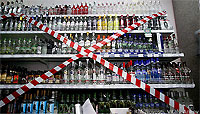Society at root of worries over rising Russian excise

(Moscow News – themoscownews.com – Maria Stambler – August 20, 2013) When Westerners think of Russia, bears, snow, matryoshki and, of course, vodka are among the first things that come to mind.
The pervasiveness and social acceptance of vodka have attracted the government’s attention in recent years due to worrying levels of alcoholism. According to a 2011 report by the World Health Organization, per capita alcohol consumption in Russia is about 15.76 liters annually, the fourth-highest volume in Europe.
This concern is not new: Soviet leader Mikhail Gorbachev launched an all-out campaign to eradicate drunkenness, revoking liquor licenses, banning vodka consumption at Soviet embassies and razing vineyards. Even President Boris Yeltsin, whose fondness for vodka was no secret, raised its price and instituted laws to keep drinking in check, only encouraging the black market for homemade samogon (moonshine).
Recent efforts have focused on taxation: in the past two years, the excise tax on alcohol has risen by 73 percent, 33 percent on Jan. 1, 2013, alone. Currently, the minimum price of a half-liter bottle is 170 rubles ($5.20), compared to 98 rubles in 2011 ($3 at current exchange rates).
A further rise, of 27 percent, will come into effect at the start of 2014.
The social impact
Some experts believe these increases will contribute to budget growth by 25 percent annually, but not everyone shares this optimism.
“The Finance Ministry thinks that 2 times 2 will equal 4, always,” Alexander Romanov, head of the Alcoholic Beverages Council, told The Moscow News. “They don’t care about reducing alcoholism or any other direct or indirect consequences their actions may have on production or on people. They care only about beefing up the budget… but 2 times 2 is not always 4 in real life.”
Romanov’s concern goes beyond the lower industry revenues that would result from lower sales of a more expensive legal product, to the social and health implications of the samogon or, worse, denatured alcohol that would replace it.
On August 9, Dmitry Dobrov, chairman of the Russian Union of Alcohol Producers, sent a letter to President Vladimir Putin, asking him to freeze the excise for spirits at its current level until at least 2017.
Dobrov expressed worry that the sudden 33 percent increase in the excise is the main reason why drinkers are turning to counterfeit alcohol or to “surrogate” products, which contain alcohol but are not intended for consumption, such as aftershave and cleaning fluids.
The economic impact
Another issue is that the Finance Ministry could be misfiring with this strategy, and lose out on the very revenues it seeks to raise.
“The government will miss out on more than 150 billion rubles in excise and other taxes,” Dobrov wrote. “Significant damage will be inflicted on the overall health of the country due to the consumption of illegal alcohol… and ‘shadow’ structures will grow rapidly and cash in on 100 billion rubles worth of revenue.”
Romanov agrees with the points outlined by Dobrov, in that increasing the excise harms not only the budget but, first and foremost, consumers. On a recent visit to a rural village, the 300-ruble price tag on a bottle of vodka shocked him.
“Maybe it can work in Moscow, but Moscow isn’t all of Russia,” he said. “In the villages, salaries are 3,000 to 4,000 rubles if they even have salaries so they don’t buy this vodka, they buy counterfeit or surrogate products.”
Another element of financial concern for the federal budget is tax evasion: some vodka producers have moved their production into the shadow economy, producing the same quality vodka, not counterfeit or unsafe, but selling it under the counter at affordable prices and depriving the government of potential tax revenue.
Putin himself is cautious of any sudden tax or price increases, citing historical lessons at a meeting of the presidium of the State Council on July 30, Vedomosti reported.
“We know what the fight against alcohol led to: people started making samogon and drinking denatured alcohol,” he said.
Long-term strategies
Romanov acknowledges the problem of alcoholism, but does not believe it can be solved by simply raising the price.
“Why not just raise it to 10,000 rubles, then people will stop drinking for sure, right?” he said. “Other measures and programs
are needed, long and scrupulous work with different sections of society.”
Romanov’s own organization engages in such work, which he said has had some success and positive responses: teaching bartenders about recognizing people who are too drunk to serve and taking serious approaches to drunk-driving and selling alcohol to minors.
Still, reducing alcoholism in Russia will require a long-term effort, but will be helped by a broader improvement in social conditions.
“As the population gets wealthier, they find other opportunities to relax other than drinking,” he said. “If a person has only a few kopecks in his pocket to pull together to buy a bottle of vodka, he’s not the one to blame for not wanting to pick up a piece of literature. So we need to battle not alcoholism, but poverty, as a former colleague of mine once said.”
